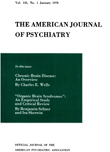AMNESTIC-CONFABULATORY SYNDROME (KORSAKOFF PSYCHOSIS) FOLLOWING HEAD INJURY
Abstract
1. Of a total of 430 patients with head injury, 40 had prolonged confusion following the injury, and of these 9 showed amnestic-confabulatory syndrome during their hospital stay. None of the 9 showed evidence of polyneuritis.
2. All 9 patients were males and 5 (55 percent) were chronic alcoholics prior to injury. This is in contrast with the 21 percent incidence of alcoholism in the group as a whole. In addition 2 others were steady but "moderate" drinkers and there was some suspicion of alcoholism in the 2 remaining. One of these received large amounts of paraldehyde in the 3½ months after injury prior to the development of an amnestic-confabulatory syndrome.
3. All 9 patients recovered. The duration of the amnestic-confabulatory syndrome varied from 2 to 44 days (average 11 days). This is in striking contrast to the grave prognosis in patients with amnestic-confabulatory syndrome with polyneuritis.
4. As a group the patients who developed amnestic-confabulatory syndrome suffered relatively severe injuries to cranial contents as judged by presence of abnormal neurological signs, presence of blood in the cerebrospinal fluid, and duration of permanent post-traumatic amnesia. However, many other patients with equally severe injuries failed to develop the amnestic-confabulatory syndrome.
5. There was no clear relationship between duration of amnestic-confabulatory syndrome and the maximum cerebrospinal fluid pressure as determined by lumbar puncture, or the presence of extensor plantar responses. The 2 patients without blood in their cerebrospinal fluid had the briefest duration of amnestic-confabulatory syndrome (2-5 days).
Access content
To read the fulltext, please use one of the options below to sign in or purchase access.- Personal login
- Institutional Login
- Sign in via OpenAthens
- Register for access
-
Please login/register if you wish to pair your device and check access availability.
Not a subscriber?
PsychiatryOnline subscription options offer access to the DSM-5 library, books, journals, CME, and patient resources. This all-in-one virtual library provides psychiatrists and mental health professionals with key resources for diagnosis, treatment, research, and professional development.
Need more help? PsychiatryOnline Customer Service may be reached by emailing [email protected] or by calling 800-368-5777 (in the U.S.) or 703-907-7322 (outside the U.S.).



